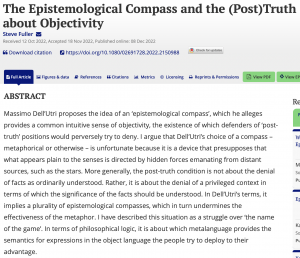This time, I am looking at an article by Steve Fuller 1 which is part of an entertaining, ongoing academic argument he is having with Massimo Dell’Utri on post-truth, epistemology and the way we make sense of the world. Fuller has taken exception to Dell’Utri’s suggestion that we have an epistemological compass which provides a universal objectivity, an independent standard by which knowledge can be evaluated.
 Fuller believes that the independent standard is not independent at all but rather created in a privileged context by those with influence and power. He believes that we are told how the world is and how it should be viewed.
Fuller believes that the independent standard is not independent at all but rather created in a privileged context by those with influence and power. He believes that we are told how the world is and how it should be viewed.
What does that mean for practice?
It means that we need to beware when we find ourselves taking a common-sense position. When we attempt to make sense of the world, the term ‘common’ implies a generally accepted objective understanding. We need to ask ourselves where these ‘common’ views came from. They are the rules of the game (See Fuller’s 2020 book 2) and they create a level playing field in which we operate, however they are not universally definitive. They are simply the norms of our own ecologies of practice. The rules of our game structure our conceptual understanding. The give us a space to work but they are nothing more than that.
In work to develop my own conceptual understanding of our practice, I attempted to articulate the rules of my game and then found myself trapped within them. I was aware that there were other communities playing different games. Some were easy to spot and others were hidden. I work in education and I could see that sociology and psychology had different games going on. Their frameworks were different and their own epistemological compasses provided them with objective direction. I wanted to shake myself free of my own compass and find new ways to understand the world. I wanted to find those games which were hidden. The unknown unknowns. I found my inadvertent, clunky use of language was a gateway to these worlds.
In analysing my own work, the concept of object language (the language of my game) and meta language (the language I used to discuss my object language) is useful here. Fuller daws on Meinong description of objectivity as a ‘homeless object’. It comes into being only when it finds a home. It exists only in relation to its context. An example of object language is the word ‘happy’ which finds objective meaning only when it relates to the context in which it exists. In this case, it is within my own articulated conceptual understanding of our practice. On re-reading this seemingly common-sense view of the world, I had a sense of unease. My epistemological compass was quivering. A portal to a new epistemological framework was through this word as I observed it finding objective meaning in the games of others. It was way of breaking free of the constricting conceptual framework of my own understanding. It is a forever project, however, and I am aware that we can never really step outside the loop as we make meaning. As we re-write our own rules, they begin to constrict us once more. There are always new games to find and ways of thinking to escape.
I believe that there is no universal compass and that they only exist within communities of practice. They do not show us the truth, they only give us direction and a ‘level playing field’ (Fuller’s term) in which to operate. They are our culture, our norms and bedded in language. I also believe that most communities of practice are unaware that they are operating in an artificially constructed objective reality where the rules of their game have been laid down by those with influence and power. They take their common understanding as universal truths. Fuller’s 2020 book takes a number of these communities and attempts to expose the rules of their games and how they affect their practices.
If objectivity only exists when an object relates to its home, I want to challenge the landing zones for the language that I use. I want to challenge true north. The word ‘behaviour’ might be a place to start. Followed on by words such as ‘success’ and ‘happy’. Challenging the common sense understanding of these words may begin to change the rules of our game and make life better for the children we serve.
- Fuller, S. (2022) The Epistemological Compass and the (Post)Truth about Objectivity, Social Epistemology, DOI10.1080/02691728.2022.2150988
Abstract
Massimo Dell’Utri proposes the idea of an ‘epistemological compass’, which he alleges provides a common intuitive sense of objectivity, the existence of which defenders of ‘post-truth’ positions would perversely try to deny. I argue that Dell’Utri’s choice of a compass – metaphorical or otherwise – is unfortunate because it is a device that presupposes that what appears plain to the senses is directed by hidden forces emanating from distant sources, such as the stars. More generally, the post-truth condition is not about the denial of facts as ordinarily understood. Rather, it is about the denial of a privileged context in terms of which the significance of the facts should be understood. In Dell’Utri’s terms, it implies a plurality of epistemological compasses, which in turn under- mines the effectiveness of the metaphor. I have described this situation as a struggle over ‘the name of the game’. In terms of philosophical logic, it is about which metalanguage provides the semantics for expressions in the object language the people try to deploy to their advantage.
- Fuller, S. 2020. A Player’s Guide to the Post-Truth Condition: The Name of the Game. London: Anthem.

